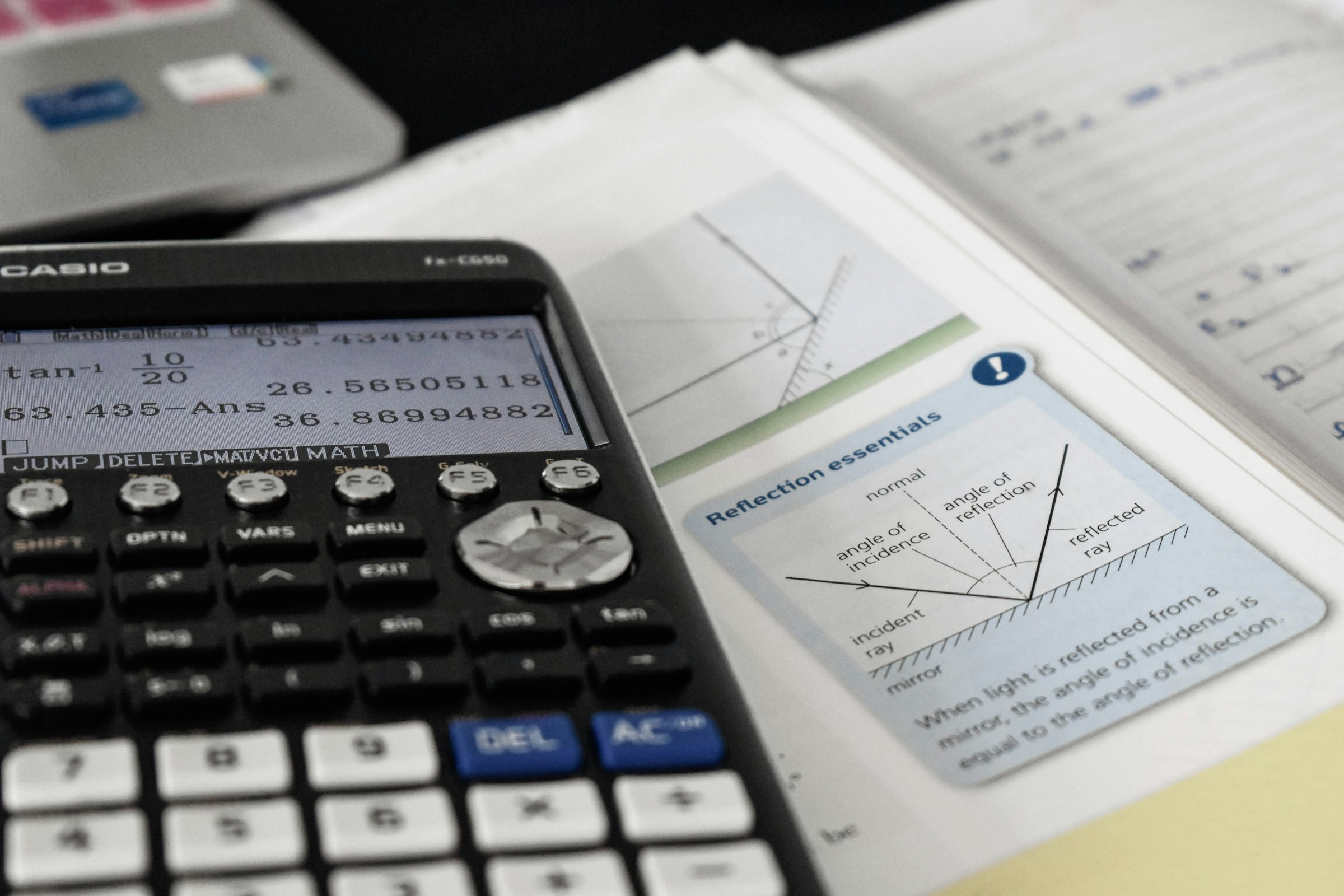GCSE Maths often sits near the top of lists of Hardest GCSE Subjects, and one tricky question can turn a confident run-through into a panic. Maybe you get stuck on algebra, lose time on a word problem, or never quite master the formulae you need for exam day. This guide breaks down practical steps, revision timetables, exam technique, past paper practice, and problem-solving to help you feel fully equipped, confident, and motivated to succeed.
To speed your progress, Ucademy's online tutoring UK pairs you with tutors who tailor revision, clear up tricky topics, and build the exam confidence and time management you need.
12 Tips on How to Pass GCSE Maths

1. Understand What to Expect in the Exam
One of the most important initial steps is to familiarize yourself with the structure and content of the GCSE Maths exams. Knowing the exam format helps you focus your revision and reduces anxiety. Typically, the exam covers six main areas: Number, Algebra, Ratio, Proportion and Rates of Change, Geometry and Measures, Probability, and Statistics.
Different exam boards like Edexcel, AQA, and OCR have slight variations in scoring and exam length, so verify which board you follow. Usually, students sit three papers: one non-calculator and two calculator papers, each lasting 90 minutes. Being clear on these details ensures no surprises on exam day and helps tailor your revision to suit your exam board’s expectations.
Additionally, understanding the grading system (1-9) gives you goals to aim for. Knowing precisely what is expected from each grade can help you break down your revision priorities and track your progress more effectively.
2. Choose the Correct Tier for You
GCSE Maths is unique in that it offers two tiers: Foundation and Higher. The Foundation tier lets you achieve grades up to 5, covering essential topics at a steady pace. The Higher tier allows for grades 4 through 9, exploring more complex mathematics suitable for ambitious students.
Choosing the right tier depends on your strengths, goals, and how confident you feel with math concepts. If you aim to pursue maths-related subjects at A-level or beyond, a Higher tier is likely necessary. However, if you’re focused on passing or consolidating your basic skills, the Foundation tier may be a better fit.
It’s important to discuss your tier selection with your teachers or school advisors, as they often make recommendations based on your performance and potential. Selecting the appropriate tier will ensure you are challenged but not overwhelmed.
3. Create and Stick to a Revision Timetable
Successful revision requires a structured plan. Starting your revision early, ideally at the beginning of Year 11, ensures you cover all topics thoroughly without last-minute cramming. Allocate specific times each week dedicated solely to maths revision.
A balanced timetable helps distribute learning across different topics, keeping your study sessions varied and engaging. You might begin with just an hour a week, gradually increasing study time as exams approach. Rotating between topics can also aid retention and prevent burnout.
Consistency is key. Regular revision builds your confidence, reinforces learning, and dramatically increases your ability to recall information under exam conditions. Early preparation means you’ll have time to work through complex topics and practice exam-style questions.
4. Practice Extensively and Consistently
Mathematics is a subject that rewards practice. Understanding theory is essential, but developing skills comes from working through problems regularly. Completing exercises related to each topic helps solidify your understanding and identify which areas need more focus.
Throughout the year, make it a habit to solve a mix of questions—from basic concepts to more challenging problems. As exams approach, try to complete full past papers under timed conditions. This helps simulate the pressure of the exam room and improve your time management skills.
Repeated practice reduces anxiety because you become familiar with question types and exam language. It also builds crucial problem-solving stamina, essential for completing all questions successfully within the time limit.
5. Read Every Question Carefully
In exams, it’s easy to lose marks by misreading questions—even when you understand the topic. Developing the habit of reading questions slowly and deliberately reduces careless mistakes. Aim to read each question at least twice to comprehend what is being asked fully.
Underline key terms or figures if it helps you focus on essential details. Sometimes questions include specific instructions or units that are easy to overlook but vital for full marks. This methodical approach keeps you attentive and improves accuracy.
Taking your time initially prevents the need for corrections later. The extra seconds spent understanding the question are worth it because misinterpretation often leads to losing unnecessary marks.
6. Attempt Every Question on the Paper
Leaving questions unanswered guarantees zero marks. Even when you’re unsure about a question, it’s better to give it a try. You might earn some marks for partial answers or working steps, even if the final answer is incorrect.
Often, examiners reward clear thinking and correct methods, so showing your approach can gain valuable partial credit. Skipping questions out of fear misses out on these easy scoring opportunities.
Being brave enough to attempt all questions can improve your overall score and boost your confidence. Remember, unanswered is definitely zero, but an attempt might be rewarded.
7. Clearly Show Your Working Out
Many students focus solely on the final answers, but examiners look for your working process too. Showing detailed working out, whether you’re sure of the answer or not, can win partial marks for a method, even if the solution isn’t entirely correct.
Write your steps neatly and logically so the examiner can follow your reasoning easily. This might help you gain marks on complex or multi-step problems. Sometimes, even when a final answer is incorrect, correct workings are rewarded.
A straightforward method also helps you track your own thought process, catch mistakes early, and build exam confidence. So, prioritize clarity in your writing during the exam.
8. Use Quality GCSE Maths Revision Resources
Beyond textbooks, numerous resources can aid your understanding and revision. Websites offer free exercises, video tutorials, interactive quizzes, and revision apps tailored to GCSE Maths.
Explore platforms that align with your exam board and learning style—visual learners might benefit from online tutorials. In contrast, others might prefer printed summaries or apps for on-the-go practice. Using a variety of resources keeps revision fresh and targets different aspects of learning.
Additionally, many tutors recommend specific materials that complement classroom learning and help clarify tricky topics. Access to reliable resources enhances your ability to revise independently and deepen your skills.
9. Practice Past Papers Under Exam Conditions
Past papers are invaluable for exam preparation because they familiarize you with question types, language, and exam demands. Working on these papers under timed, exam-like conditions helps build your endurance and refine your time management strategies.
Simulating exam pressure allows you to experience how to pace yourself and prioritize questions effectively. After completing a paper, review and mark your answers honestly, learning from mistakes.
Regularly practicing full papers builds confidence, reduces exam day nerves, and signals areas needing further attention, ensuring you enter the exam well-prepared and calm.
10. Manage Your Exam Time Wisely
Effective time management during the exam is crucial for answering as many questions as possible. Plan to spend more time on higher-mark questions and allocate less time to simpler, low-value items.
Keep an eye on the clock and leave time at the end to review your answers. Revisiting challenging questions could salvage marks you might otherwise miss and catch careless errors.
Effective time planning helps prevent the stress of rushing near the end, giving you more control and improving your overall performance.
11. Stay Calm and Avoid Panic
Anxiety during exams is common but manageable. Remember that GCSE Maths is an opportunity to show what you know, not to trick you. Approach each question deliberately and calmly.
Practice deep breathing or visualization techniques before and during the exam to maintain composure. If you get stuck, move on and return later to avoid losing valuable time or confidence.
Maintaining a positive mindset boosts focus and decision-making, which are essential to navigating questions and maximizing your score.
12. Seek the Help of a Tutor
While schools provide valuable support, personalized tutoring can significantly enhance your progress. A tutor offers one-on-one attention tailored to your unique strengths and weaknesses, adapting lessons to your preferred learning style.
Many tutors are experienced teachers or examiners familiar with the GCSE structure. They can provide focused revision strategies, clarify complex concepts, and guide you through exam techniques to boost your confidence and performance.
Moreover, tutors often share valuable resources and practice materials to complement your study. Investing in a tutor can sharply increase your chances of achieving better grades and developing lasting math skills.
Ucademy uses a proven British Curriculum method that has helped thousands of students reach top grades with expert tutors from universities such as Oxford and Cambridge guiding every step. Explore our online tutoring UK options and book a free consultation to get your free university readiness audit and action plan.
Related Reading
- How Much Do GCSEs Cost
- How Many GCSEs Do You Take
- Is IGCSE Easier Than GCSE
- GCSE Grades Percentages
- How to Revise for Biology GCSE
- How to Prepare for GCSE
Tips on How to Pass GCSE Maths Foundation

Master the Fundamentals First
One crucial step to passing the GCSE Maths Foundation paper is solidifying your understanding of the foundational maths concepts. If you’ve struggled with maths in the past, it’s often because basic skills weren’t fully grasped. For example, trying to learn algebra before confidently handling multiplication and division is likely to cause confusion and frustration. The foundation tier is designed to focus on core, accessible areas, aiming at grades 4 and 5, rather than the more complex topics found in higher tiers.
By concentrating on the basics, you build a strong platform upon which more advanced skills can develop. This means ensuring you are comfortable with essential arithmetic, fractions, percentages, and simple equations before moving on. Seeking extra help, like working with a tutor, can be invaluable. A tutor can identify any gaps you have in your knowledge and help you revisit those critical building blocks, ensuring you don’t miss key concepts that could cost you marks come exam day.
Committing to mastering fundamentals also reduces anxiety because the material feels more manageable and less overwhelming. When you’re confident with the core topics, you develop a positive mindset and are better equipped to tackle exam questions thoughtfully and accurately.
Tailor Your Revision to Key Topics
To maximise your chances of passing, it’s essential to focus your revision on the areas that carry the most weight in the foundation paper. While both foundation and higher tiers cover the same six broad topics, the foundation version places greater emphasis on concepts like number operations, ratio, proportion, and rates of change. In contrast, higher-tier exams test more complex algebra, geometry, and problem-solving skills.
By identifying these priority topics early, you can dedicate more study time to them and avoid spending unnecessary hours on subjects that are less relevant to your exam. Strategically focusing your effort means you can build confidence and improve accuracy where it counts most, boosting your overall score more efficiently.
Creating a smart revision timetable that reflects these priorities helps maintain a balanced approach. For example, allocate extra time each week to practising questions on ratio and proportion while revisiting key number skills regularly. This targeted revision approach increases the likelihood of scoring higher on exam sections designed for foundation-level candidates.
Practice Using Foundation-Specific Past Papers
Nothing prepares you better for the actual exam than practising with past papers drawn from the exact tier you will be taking. Doing foundation-tier past papers gives you the chance to become familiar with the style of questions, the exam format, and the typical level of difficulty you can expect. This reduces surprises on exam day and helps build exam technique.
It’s important not to waste time on higher-tier papers that include content you won’t be tested on during your foundation exam. This misdirected practice can divert your attention away from mastering the requirements of your paper and lower overall effectiveness. Instead, focus on completing numerous foundation papers under timed conditions to simulate the real test environment. This also helps improve time management skills, a key element in completing all questions.
Getting regular feedback, whether from a teacher, tutor, or self-marking, is crucial to learning from your mistakes and improving. A knowledgeable tutor can provide you with appropriate practice materials and guide you through any challenging questions, ensuring your revision is both relevant and efficient.
Related Reading
- Is 7 a Good GCSE Grade
- How to Revise for English Language Paper 1
- How to Revise for Spanish GCSE
- How to Revise for History GCSE
- Bad GCSE Grades
Frequently Asked Questions

How Can I Obtain GCSE Maths Past and Sample Papers Online?
Accessing past or sample GCSE Maths papers is straightforward through your specific exam board’s official website, such as Edexcel, AQA, or OCR. They provide a repository of previous years' papers, along with specimen or sample papers you can download for practice. These resources are invaluable for familiarizing yourself with exam question formats and standards.
What Revision Strategies Are Most Effective for GCSE Maths?
One of the most effective ways to revise for GCSE Maths is by consistently practising past examination papers and self-testing your knowledge. This method helps identify areas you understand well and those that need improvement. Incorporating regular, short revision sessions with active problem-solving leads to better retention and exam confidence.
Where Can I Find GCSE Maths Problem-Solving Questions?
Problem-solving questions tailored to GCSE Maths are commonly found within past exam papers provided by recognized exam boards like Edexcel, AQA, and OCR. In addition, many educational websites and revision platforms offer collections of problem-solving exercises designed to enhance your analytical and reasoning skills, an essential component of the exam.
What Are the Key Maths Equations to Know for GCSE?
Specific mathematical formulas are fundamental for success in GCSE Maths. These include the quadratic formula, Pythagoras’ theorem, linear equations such as y = mx + c, area and volume formulas for a variety of geometric shapes, plus essential algebraic expressions. Regular practice using these equations will strengthen your confidence and problem-solving ability.
How Should I Manage My Revision Time for GCSE Maths?
There isn’t a fixed number of hours that guarantee success in GCSE Maths. However, shorter, consistent study sessions of around 20 minutes multiple times a week tend to be more productive than sporadic marathon sessions. It’s also crucial to take breaks every 20-25 minutes to maintain concentration, while minimizing distractions such as television or social media.
Which Topics Are Most Important to Revise for GCSE Maths?
Because GCSE Maths exams can cover the entire syllabus, comprehensive revision is advisable. Foundation tier students should prioritize numbers, arithmetic, proportional reasoning, geometry, and measurement. Higher-tier students need to focus on these areas, plus advanced algebra and integrated problems that require applying multiple skills simultaneously.
How Can I Aim for the Highest Grade (9) in GCSE Maths?
Achieving a grade 9 demands early and continuous revision. Begin revising from the start of your course, regularly revisiting previously learned topics to solidify understanding while gradually incorporating new material. Make a special effort to target weaker topics and challenge yourself with difficult practice questions to elevate your performance.
Are There Specific Tips for Non-Calculator and Calculator GCSE Maths Papers?
For the non-calculator paper, honing mental arithmetic, recognizing number patterns, and solving algebraic problems without a calculator are crucial for speed and accuracy. On the calculator paper, mastering your calculator’s functions, knowing when to estimate versus find exact answers, and practising word problems or data interpretation can improve efficiency and accuracy during the exam.
Where Can I Find Official GCSE Maths Exam Questions?
Official GCSE Maths questions are primarily accessible through your exam board’s website. These sites regularly update their archives with official papers, question banks, mark schemes, and examiner reports that offer insights into question styles and examiners’ expectations.
How Do I Access GCSE Sample Papers Specifically?
Similar to past papers, GCSE sample papers are available on the websites of various exam boards like Edexcel, AQA, and OCR. These sample papers are designed to mirror actual exam content and structure, providing an excellent resource for exam preparation and familiarization with question formats.
Book a Free Consultation Today | Free University Readiness Audit
Ucademy uses a proven British Curriculum method that has guided thousands of students to top GCSE grades. Our tutors come from leading universities and know the AQA, Edexcel, and OCR specifications inside out. They map topics such as algebra, numbers, geometry, and probability to exam mark schemes and grade boundaries, enabling students to focus on what examiners look for. How would your child respond to a tutor who builds lessons from specification outcomes and examiner reports?
A GCSE Maths Study Routine That Actually Works
We create a clear revision plan with spaced repetition, active recall, and timed past paper practice. Students learn to pace themselves using mark allocation, practise non calculator and calculator papers, and improve accuracy with mental arithmetic drills. Each week combines worked examples, targeted practice on weak topics, and exam technique sessions on command words such as calculate, prove, and show that. Can you spare three focused practice blocks this week to try a new routine?
What Expert Tutors Do Differently for GCSE Maths
Our tutors model complete solutions while showing method and reasoning, so students pick up method marks even when the final answer is wrong. They break complex topics into steps: factorising quadratics, solving simultaneous equations, manipulating fractions and percentages, interpreting graphs, and handling standard form. Tutors use past papers, mark schemes, and examiner comments to teach how to structure answers and avoid common errors. Would your child benefit from regular feedback that converts mistakes into steady improvements?
How Ucademy Personalises a Roadmap for Your Child
We begin with a diagnostic test to identify gaps in algebra, number, ratio, geometry, trigonometry, and statistics. Then we build a personalised learning plan with weekly targets, milestone checks, and evidence-based tasks. Plans include mock exams to track progress under timed conditions and micro lessons on calculator skills, formula recall, and exam strategy. Parents get clear checkpoints so they know when to step in and when to let the student drive their own progress.
How Ucademy Provides Structured Accountability for Busy Parents
We design a framework so parents do not have to micro-manage study. You receive progress reports, weekly action points, and clear homework that links to exam practice. Tutors set achievable targets, log completed past papers, and flag when intervention is needed. The system keeps the student accountable while keeping parental involvement practical and focused on outcomes rather than hours spent.
What the Free University Readiness Audit Includes and How to Book
Book your free consultation to get a university readiness audit and a tailored action plan. The audit reviews predicted GCSE and A-level outcomes, identifies subject gaps, suggests exam board strategies, and outlines UCAS timing and subject choices for competitive courses. After the call, you will have a clear set of next steps and a recommended tutoring plan. Ready to schedule a free consultation and get the audit started?
Related Reading
- How Important Are GCSEs for University
- How to Revise for GCSE in Year 10
- Best Revision Books for GCSE
- Best GCSE Subjects

.jpg)




